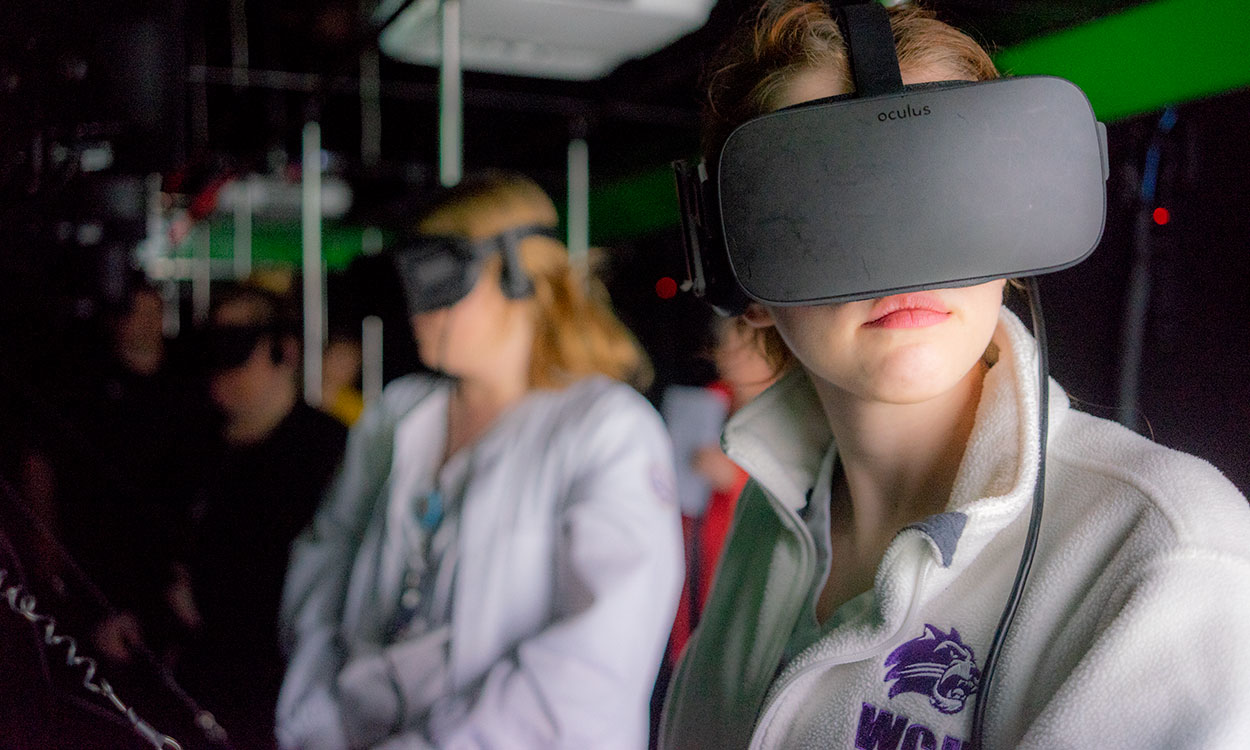Nursing students test virtual reality simulation technology at MAHEC

WCU nursing students were among a select group chosen to test a new virtual reality technology at the Mountain Area Health Education Center's Biltmore Campus.
Students in Western Carolina University’s School of Nursing tested a new virtual reality simulation technology Tuesday, April 9, at the Mountain Area Health Education Center’s Biltmore Campus.
WCU developed the innovative training program in partnership with Learning Lab 360 and the Mountain Area Health Education Center as part of a $2.7 million federal grant designed to support community-based primary care clinical experiences for nurses.
During Tuesday’s pilot launch of the simulation, participants donned virtual reality masks and entered a scene where a patient had come into a clinic experiencing an allergic reaction to medication that worsened rapidly and included difficulty breathing. Learners had to make rapid decisions about the patient’s care and prioritize their responses at numerous points during the simulation.
“Using virtual reality in clinical education allows learners to be involved in real-life experiences without real-life consequences,” said Elaine Alexander, MAHEC simulation center director. “The beauty of these simulations is that they can provide training in high-risk situations without putting real patients or learners in danger.”
This first of three virtual reality simulation scenarios was tested by a select group of students from WCU’s baccalaureate nursing program, regional nurse educators and clinical training partners from WCU’s Ambulatory Nursing Consortium, which includes Blue Ridge Health, Charles George VA Medical Center, Cherokee Indian Hospital, MAHEC and Mission Health.
This high-tech training is part of a federally funded grant from the Health Resources and Services Administration to WCU’s School of Nursing. The goal of the grant is to innovate baccalaureate nursing curriculum to prepare registered nurses to work at the full scope of their license and support the cost-effective delivery of high-quality primary care services.
“The use of virtual reality technology is novel as is the focus of this simulation,” said Kae Rivers Livsey, associate director of the WCU School of Nursing and lead faculty member on the grant project. “This simulation will be part of innovative educational strategies, including a nurse residency and fellowship that will embed registered nurses in primary care settings across the region to gain the clinical experience necessary to help patients manage chronic diseases, connect to community resources and navigate the health care system.”
WCU nursing students who took part in the virtual reality simulation found themselves dealing with a situation in which a patient is given an antibiotic after being bitten by a cat, then a short while later goes into anaphylactic shock.
“It was pretty realistic,” said Patricia Rade, a senior nursing major from Durham. “It felt like I was at the scene and I was dealing with an actual emergency case. It was a great experience. I actually had to use my knowledge and critical thinking skills to prioritize the best action.”
Amanda Morrison, a senior nursing major from Cincinnati, Ohio, agreed, calling the activity “an incredible learning experience” that builds upon what students get in classrooms and from working on medical mannequins.
“I think that it’s real important for all nursing students to have simulation labs and also to have clinicals where you have real, live patients,” Morrison said. “This had elements of both, as it has that real safe environment, but there is a real, live patient in front of you who is obviously having trouble and you have to determine what you have to do next.”
Holli Frank, a Canton resident enrolled in the Regionally Increasing Baccalaureate Nursing Program (or RIBN), said that the virtual reality scenario forced the students to think quickly and accomplish multiple tasks.
“I realized that, in real life, you are doing a lot of things at the same time. You are getting their vitals, checking their breathing and all of that, all at the same time,” Frank said. “I thought this was very valuable. You are able to get into a real-life situation, or what feels like a real-life situation, but it doesn’t matter what mistakes you might make because you’re not actually going to hurt anyone. It’s a really safe environment to learn in.”
The first cohort of the 6-month residency/fellowship is scheduled to begin this July. The virtual reality simulations are designed to help participating registered nurses develop their critical thinking skills in emergency situations before they may encounter them in a clinic.
The pilot launch was conducted on Learning Lab 360’s mobile VR bus, located outside of the Simulation Center on MAHEC’s Biltmore Campus.
For more information about WCU’s “RNs in Primary Care” grant and registered nurse residency and fellowship opportunities, contact Jennifer Bruni at jbruni@wcu.edu or 828-654-6516.
For more information about MAHEC’s Simulation Center, contact Elaine Alexander, RN, MSN, at elaine.alexander@mahec.net or 828-257-4414.

